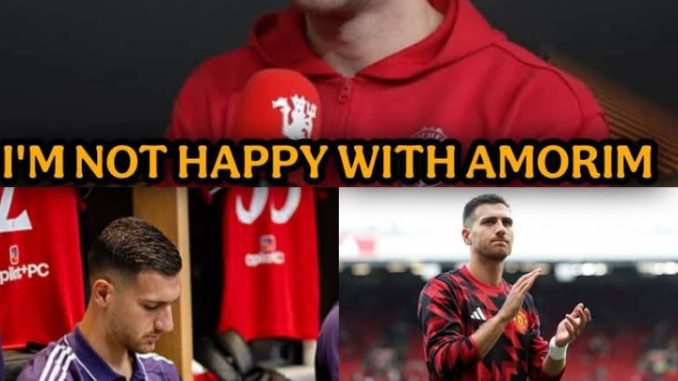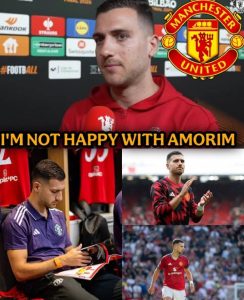
BREAKING: Dalot Left Hurt by Amorim’s Touchline Words After Substitution – “Not the First Time,” Says Defender
A fresh controversy has hit Manchester United as fullback Diogo Dalot reportedly expressed frustration over a comment made by manager Rúben Amorim during the club’s recent match. Following his substitution, Dalot admitted that Amorim’s words on the touchline “really pained” him—adding that this wasn’t the first time he’s felt disrespected under the new boss.
The Portuguese defender, who has largely been viewed as one of United’s more consistent performers in a turbulent season, said he has “endured enough” and that Amorim needs to recognize “not all players can tolerate that kind of treatment.”
While the exact quote from Amorim hasn’t been made public, Dalot’s comments were enough to ignite a wave of reaction online, with some fans going as far as to call for the manager’s dismissal.
Dalot Speaks Out: “It Really Pained Me”
Speaking in what appeared to be a moment of vulnerability and honesty, Dalot didn’t mince words:
> “This is not the first time that Amorim has said something like this, but what he said to me yesterday on the touchline after taking me off… it really pained me. I’ve tried to endure it, I’ve kept quiet, I’ve worked hard. But I think he needs to understand that not every player responds to that kind of talk.”
While Dalot stopped short of revealing the exact phrase Amorim used, his body language and tone left no doubt that the moment had affected him deeply.
> “I always try to respect the manager’s decisions—even when they hurt. But I think there’s a way to speak to your players, especially during a match. We’re not robots. We’re human beings trying to give our all.”
Trouble Brewing Beneath the Surface?
Dalot’s statement has added to growing speculation that not all is well within the United dressing room under Amorim’s reign. While Amorim was initially welcomed as a bold, tactically sharp manager following his success at Sporting CP, his transition to the Premier League has been anything but smooth.
Multiple sources close to the club suggest that some players have been unsettled by the intensity of Amorim’s methods, with his emotionally charged style described by some insiders as “motivating,” and by others as “overbearing.”
Amorim has, at times, been brutally honest in public—previously describing United as “maybe the worst team in the club’s history” after a loss to Brighton. While he later clarified those remarks were self-critical, some players reportedly took them to heart.
Dalot’s comments may signal a deeper disconnect—particularly between Amorim’s high-pressure coaching style and the players’ capacity to respond to it.
Fans React: Division Over Amorim Deepens
News of Dalot’s remarks quickly spread across social media, drawing a flood of reactions from Manchester United supporters. Some sympathized with the defender, suggesting that public or semi-public rebukes can be demoralizing.
One fan wrote:
> “Dalot has been one of the few consistent players this season. If even he is feeling disrespected, it says something about the manager’s man-management. You can’t keep breaking players’ spirits.”
Others, however, defended Amorim’s tough-love approach, arguing that a club in United’s current position needs a strong, demanding figure at the helm—even if that means ruffling feathers.
> “This club has been too soft for too long. Amorim’s not here to make friends. He’s here to rebuild a broken team. Dalot should take the criticism on the chin and prove himself.”
Man-Management in the Modern Game
The incident has reignited a broader debate in football: what kind of leadership works in the modern dressing room? With players under more media scrutiny than ever and managers under constant pressure to deliver results, finding the right tone has become increasingly difficult.
Some of the game’s most successful recent managers—like Jurgen Klopp and Carlo Ancelotti—have been praised for building relationships and creating emotional bonds with their squads. Others, like Jose Mourinho and Antonio Conte, have drawn criticism for alienating players through aggressive communication styles.
Rúben Amorim, still only in his early 40s, is learning that in the Premier League, man-management is as important as tactical acumen.
Dalot’s Track Record: A Voice Worth Listening To?
Diogo Dalot is not known for outbursts or attention-seeking behavior. In fact, since arriving at Manchester United in 2018, he has earned a reputation for professionalism and hard work. He was one of the few players to thrive under multiple managers—Ole Gunnar Solskjær, Ralf Rangnick, Erik ten Hag, and now Amorim.
If someone like Dalot is going public with concerns, it could suggest a tipping point. He has rarely made headlines for the wrong reasons, and his decision to speak out may have been born more of necessity than of ego.
Insiders say he raised his concerns privately before, only to see little change. If true, his public statement might be seen as a last resort.
What’s Next for Amorim?
Whether or not Amorim addressed Dalot inappropriately on the touchline, the situation now demands attention. The club’s leadership—including the newly appointed sporting director and co-owners—may need to step in and manage the fallout.
Amorim is already under pressure due to inconsistent results and growing frustration among fans. Another public rift—especially with a respected squad member—could undermine his authority at a crucial time.
The ideal response? Clear communication and reconciliation. Amorim will likely need to sit down with Dalot, hear him out, and chart a way forward—publicly or privately.
A Club in Transition
Manchester United are still navigating the early stages of a long-overdue rebuild. Amorim was hired to modernize the squad, impose a clear tactical identity, and instill discipline. But, as recent weeks show, the process is anything but smooth.
Moments like this—where tensions rise and emotions flare—are inevitable in high-pressure environments. But the way they’re handled determines the club’s future trajectory.
For now, the question remains: Can Amorim evolve as a man-manager in time to save his project?
And equally pressing: Will Dalot—and others like him—feel heard and valued, or will they start looking elsewhere?

Leave a Reply